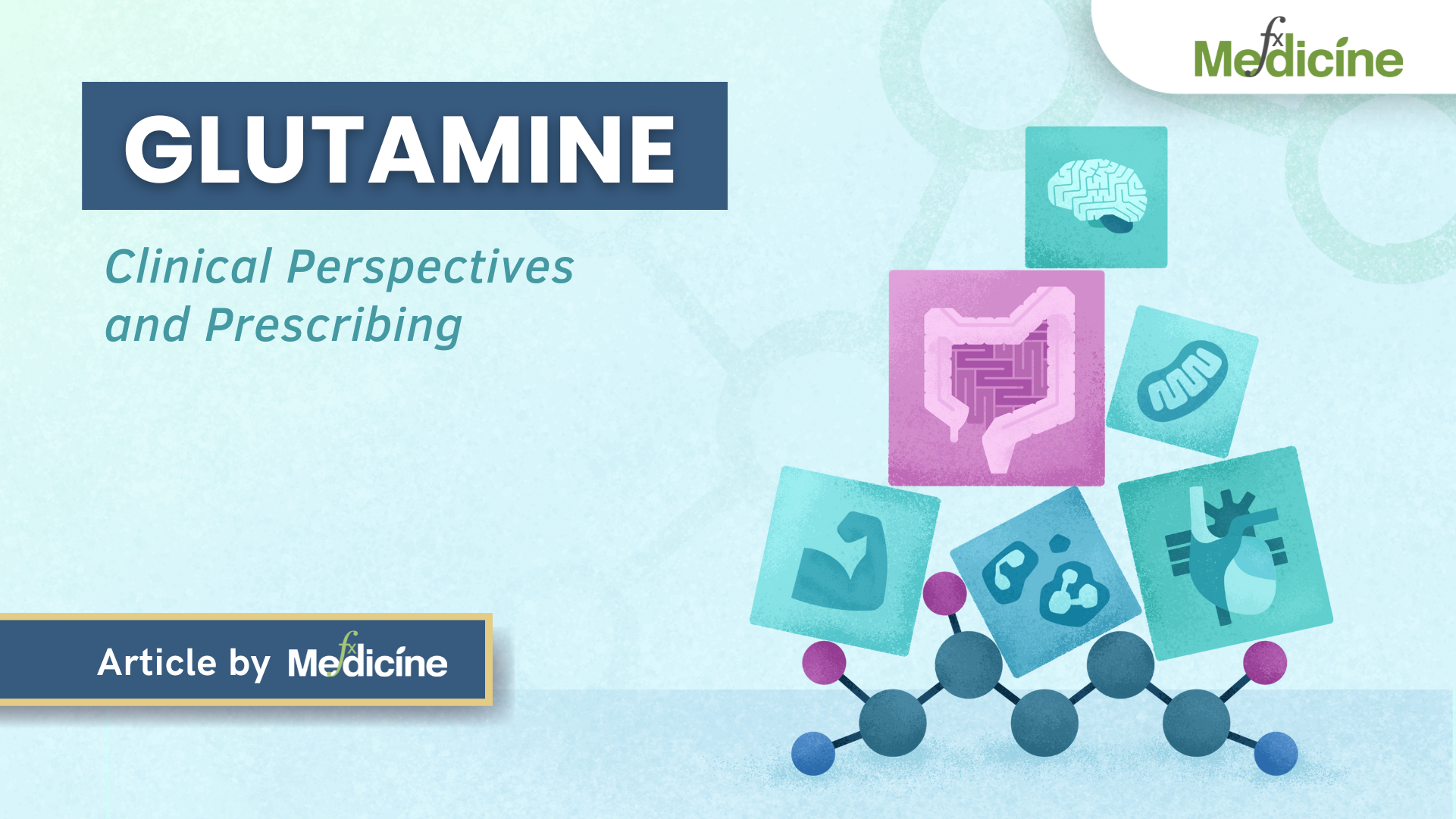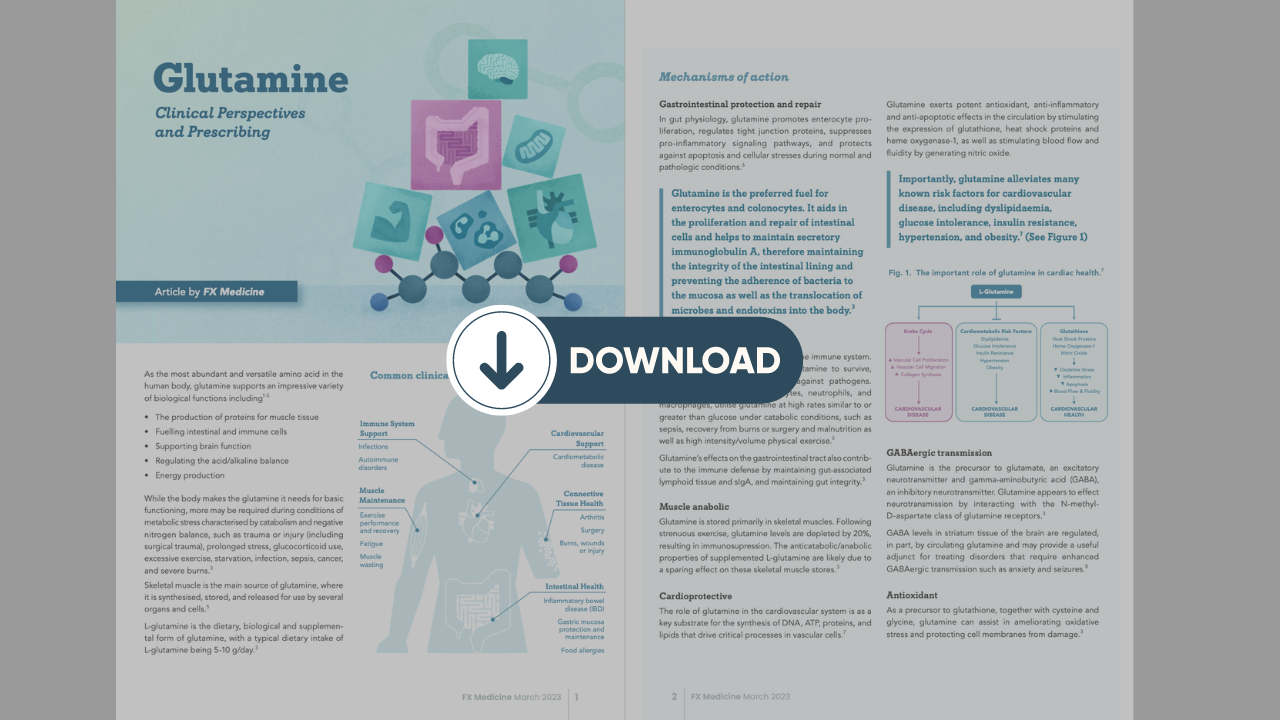As the most abundant and versatile amino acid in the human body, glutamine supports an impressive variety of biological functions including1-5
- The production of proteins for muscle tissue
- Fuelling intestinal and immune cells
- Supporting brain function
- Regulating the acid/alkaline balance
- Energy production
While the body makes the glutamine it needs for basic functioning, more may be required during conditions of metabolic stress characterised by catabolism and negative nitrogen balance, such as trauma or injury (including surgical trauma), prolonged stress, glucocorticoid use, excessive exercise, starvation, infection, sepsis, cancer, and severe burns.3
Skeletal muscle is the main source of glutamine, where it is synthesised, stored, and released for use by several organs and cells.5
L-glutamine is the dietary, biological and supplemental form of glutamine, with a typical dietary intake of L-glutamine being 5-10 g/day.3
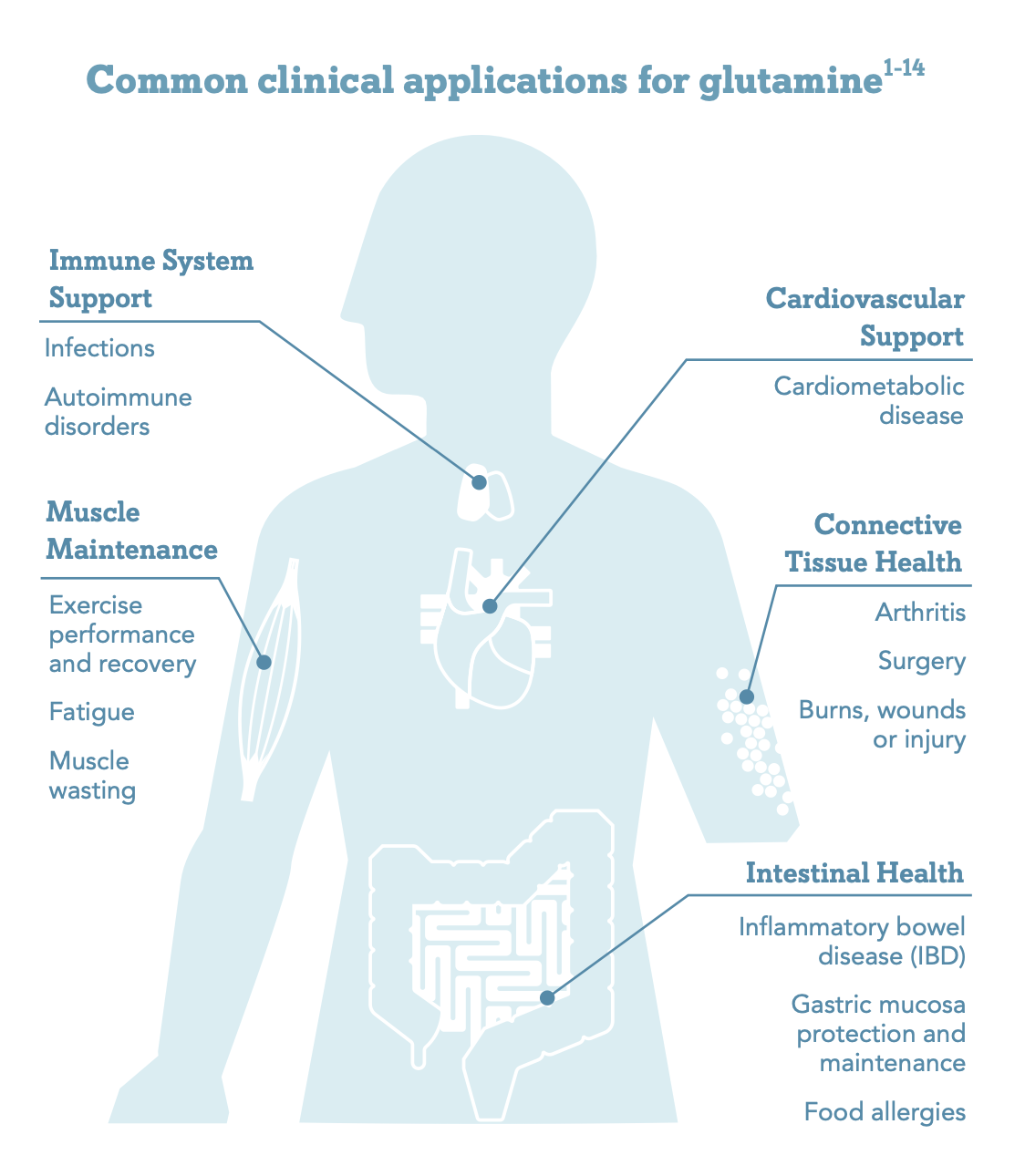
Mechanisms of action
Gastrointestinal protection and repair
In gut physiology, glutamine promotes enterocyte proliferation, regulates tight junction proteins, suppresses pro-inflammatory signalling pathways, and protects against apoptosis and cellular stresses during normal and pathologic conditions.6
Glutamine is the preferred fuel for enterocytes and colonocytes. It aids in the proliferation and repair of intestinal cells and helps to maintain secretory immunoglobulin A, therefore maintaining the integrity of the intestinal lining and preventing the adherence of bacteria to the mucosa as well as the translocation of microbes and endotoxins into the body.3
Immunomodulation
Glutamine is also considered fuel for the immune system. Immune cells largely depend on glutamine to survive, proliferate, function, and defend against pathogens. Immune cells, such as lymphocytes, neutrophils, and macrophages, utilise glutamine at high rates similar to or greater than glucose under catabolic conditions, such as sepsis, recovery from burns or surgery and malnutrition as well as high intensity/volume physical exercise.5
Glutamine’s effects on the gastrointestinal tract also contribute to the immune defense by maintaining gut-associated lymphoid tissue and sIgA, and maintaining gut integrity.3
Muscle anabolic
Glutamine is stored primarily in skeletal muscles. Following strenuous exercise, glutamine levels are depleted by 20%, resulting in immunosupression. The anticatabolic/anabolic properties of supplemented L-glutamine are likely due to a sparing effect on these skeletal muscle stores.3
Cardioprotective
The role of glutamine in the cardiovascular system is as a key substrate for the synthesis of DNA, ATP, proteins, and lipids that drive critical processes in vascular cells.7
Glutamine exerts potent antioxidant, anti-inflammatory and anti-apoptotic effects in the circulation by stimulating the expression of glutathione, heat shock proteins and heme oxygenase-1, as well as stimulating blood flow and fluidity by generating nitric oxide.
Importantly, glutamine alleviates many known risk factors for cardiovascular disease, including dyslipidaemia, glucose intolerance, insulin resistance, hypertension, and obesity.7 (See Figure 1)
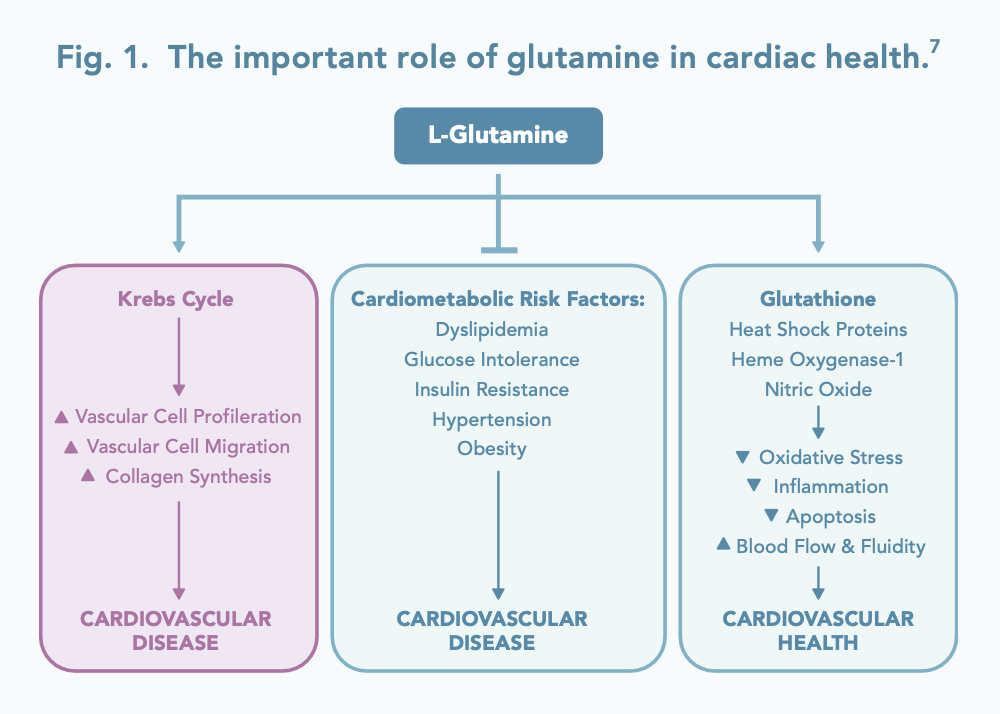
GABAergic transmission
Glutamine is the precursor to glutamate, an excitatory neurotransmitter and gamma-aminobutyric acid (GABA), an inhibitory neurotransmitter. Glutamine appears to effect neurotransmission by interacting with the N-methyl- D-aspartate class of glutamine receptors.3
GABA levels in striatum tissue of the brain are regulated, in part, by circulating glutamine and may provide a useful adjunct for treating disorders that require enhanced GABAergic transmission such as anxiety and seizures.8
Antioxidant
As a precursor to glutathione, together with cysteine and glycine, glutamine can assist in ameliorating oxidative stress and protecting cell membranes from damage.3
Dosage ranges
The typical oral daily dose of glutamine varies from a fixed dose of 20-35 g to an adjusted dose of 0.3-0.5 g per kg of body weight.5,9,10
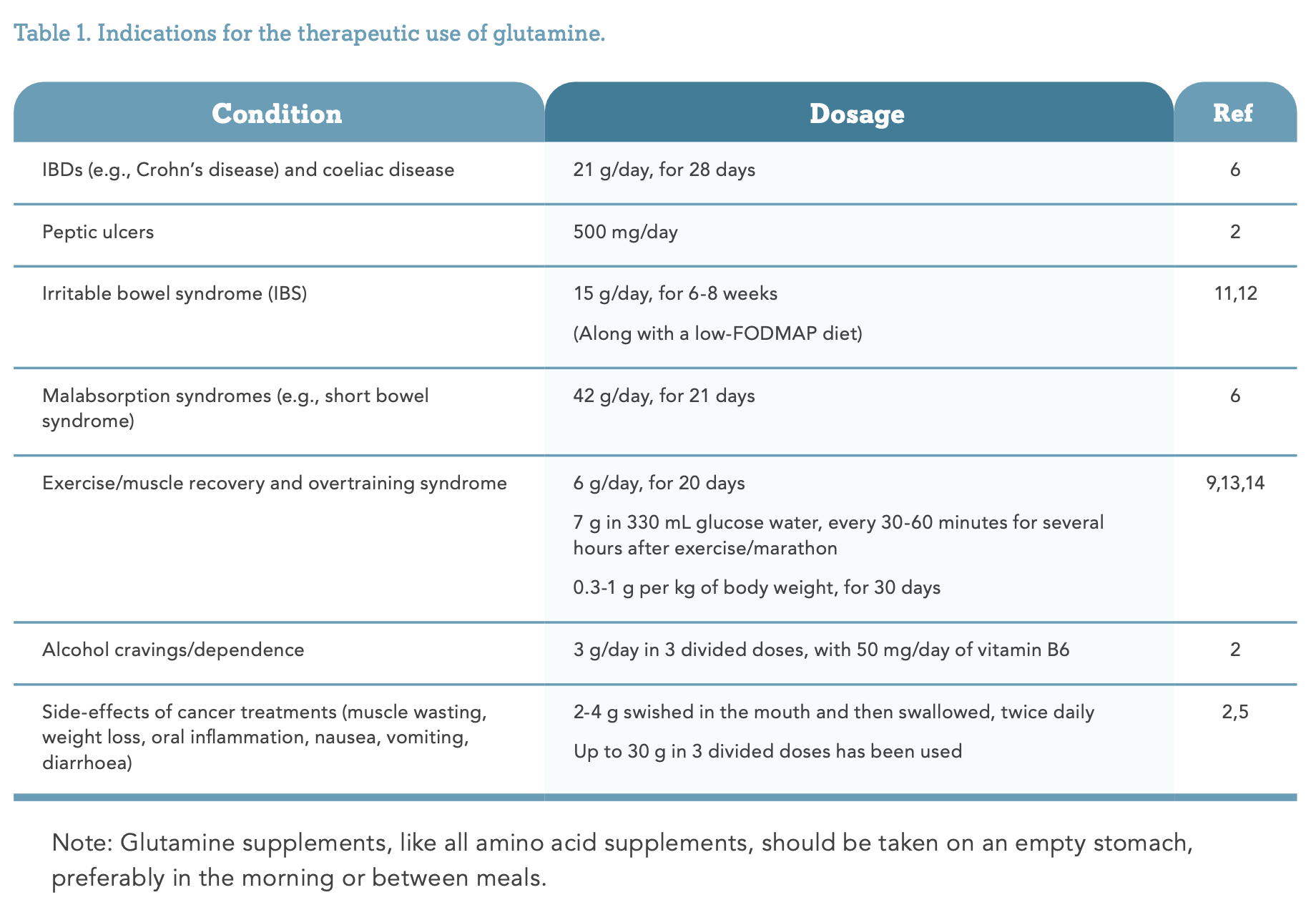
Cautions and contraindications2,3
As glutamine is an amino acid, supplementation with glutamine is not recommended in patients who have Reye’s syndrome, kidney disease, cirrhosis of the liver, or other illnesses that cause overload of ammonia in the body.
Safety in pregnancy has not been established, however, doses in line with normal dietary intake (approximately 10 g/day) are unlikely to be cause for concern.
Most side effects are mild and uncommon; they include gastrointestinal complaints such as constipation and bloating.
Glutamine supplements must be kept completely dry because moisture causes glutamine powder to break down into ammonia and pyroglutamic acid.
Glutamine supplementation
Glutamine offers an impressive array of clinical benefits to the patient and is commonly used to support gastrointestinal health due to its beneficial role in enterocyte health among other functions.
While the body can generate glutamine endogenously, to obtain optimal benefit, supplementation at therapeutic doses may be required.
Download a pdf version of this article
References
1. DP Baby. Health benefits of glutamine. WebMD 2022, https://www.webmd.com/diet/health-benefits-glutamine
2. Glutamine. Research database, IMGateway 2023, https://www.imgateway.net/page.jsp?p_name=home
3. Braun L, Cohen M. Herbs and natural supplements: an evidence-based guide, 4th ed. Chatswood: Elsevier Australia, 2015.
4. Ma X, Cai D, Zhu Y, et al. L-glutamine alleviates osteoarthritis by regulating lncRNA-NKILA expression through the TGF-β 1/SMAD2/3 signalling pathway. Clin Sci (Lond) 2022;136(13):1053-1069.
5. Cruzat V, Rogero MM, Keane KN, et al. Glutamine: metabolism and immune function, supplementation and clinical translation. Nutri- ents 2018;10:1564.
6. Kim MH, Kim H. The roles of glutamine in the intestine and its implication in intestinal diseases. Int J Mol Sci 2017;18:1051.
7. Durante W. The emerging role of l-glutamine in cardiovascular health and disease. Nutrients 2019;11(9):2092.
8. Wang L, Maher TJ, Wurtman RJ. Oral L-glutamine increases GABA levels in striatal tissue and extracellular fluid. FASEB J 2007;21(4):1227- 1232.
9. Gleeson M. Dosing and efficacy of glutamine supplementation in human exercise and sport training. J Nutr 2008;138:2045S-2049S.
10. Wernerman J. Clinical use of glutamine supplementation. J Nutr 2008;138: 2040S-2044S.
11. Rastgoo S, Ebrahimi-Daryani N, Agah S, et al. Glutamine supplementation enhances the effects of a low fodmap diet in irritable bowel syndrome management. Front Nutr 2021;8:746703.
12. Zhou QQ, Verne ML, Fields JZ, et al. A randomized placebo-controlled trial of dietary glutamine supplements for post-infectious irritable bowel syndrome. Gut 2019;68(6):996-1002.
13. Córdova-Martínez A, Caballero-García A, Bello HJ, et al. Effect of glutamine supplementation on muscular damage biomarkers in professional basketball players. Nutrients 2021;13:2073.
14. Almeida EB, Santos J, Paixao V, et al. L-glutamine supplementation improves the benefits of combined-exercise training on oral redox balance and inflammatory status in elderly individuals. Oxidative Med Cellul Longev 2020;2020:Article ID 2852181.
Disclaimer: This document is for health professionals only. It is intended to provide general information to health professionals on the indications, mechanism of action, clinical studies, cautions and contraindications of complementary medicine ingredients. It is not a substitute for clinical judgement on a case-by-case basis.


